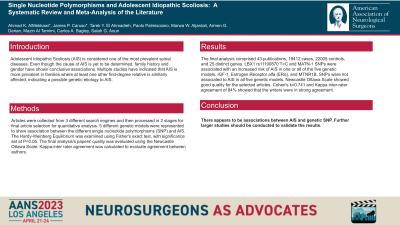Single Nucleotide Polymorphisms and Adolescents Idiopathic Scoliosis: A Systematic Review and Meta-analysis of the Literature
Friday, April 21, 2023


James Caruso (he/him/his)
Resident Physician
UT Southwestern Department of Neurological Surgery
Dallas, Texas, United States
ePoster Presenter(s)
Introduction: Adolescent idiopathic scoliosis (AIS) is a prevalent and debilitating spine disease. The underlying cause of AIS development is difficult to elucidate, but family history and gender may play a role, since multiple studies suggest that AIS is more prevalent in people with similarly affected first-degree relatives. To further clarify this association, this work aims to elucidate genetic signatures of AIS through focus on single nucleotide polymorphisms (SNPs)
Methods: Eligible articles were identified and screened from three academic search engines, and titles and abstracts were reviewed for final analysis. Five different genetic models were represented to show associations between distinct SNPs and AIS incidence. The Hardy Weinberg Equilibrium was examined using Fisher's exact test, with significance set at P< 0.05. Quality of evidence for included literature was evaluated using the Newcastle Ottawa Scale, and Kappa-inter rater agreement was calculated to evaluate agreement between reviewing authors
Results: The final analysis comprised 43 publications, 19,412 cases, 22,005 controls, and 25 distinct genes. LBX1 rs11190870 T>C SNP was significantly associated with an increased risk of AIS in all of the five genetic models. The G allele of the MATN-1 SNP was also associated with an elevated risk of AIS. Both IGF-1 and VDR gene SNPs were associated with AIS. Newcastle Ottawa Scale revealed good quality for the selected articles. Cohen's k = 0.741 and Kappa inter-rater agreement of 84% showed that the writers were in strong agreement.
Conclusion : Individual SNPs have statistically significant associations with increased incidence of AIS.
Larger studies are warranted to investigate the genetic mechanisms of AIS development
Methods: Eligible articles were identified and screened from three academic search engines, and titles and abstracts were reviewed for final analysis. Five different genetic models were represented to show associations between distinct SNPs and AIS incidence. The Hardy Weinberg Equilibrium was examined using Fisher's exact test, with significance set at P< 0.05. Quality of evidence for included literature was evaluated using the Newcastle Ottawa Scale, and Kappa-inter rater agreement was calculated to evaluate agreement between reviewing authors
Results: The final analysis comprised 43 publications, 19,412 cases, 22,005 controls, and 25 distinct genes. LBX1 rs11190870 T>C SNP was significantly associated with an increased risk of AIS in all of the five genetic models. The G allele of the MATN-1 SNP was also associated with an elevated risk of AIS. Both IGF-1 and VDR gene SNPs were associated with AIS. Newcastle Ottawa Scale revealed good quality for the selected articles. Cohen's k = 0.741 and Kappa inter-rater agreement of 84% showed that the writers were in strong agreement.
Conclusion : Individual SNPs have statistically significant associations with increased incidence of AIS.
Larger studies are warranted to investigate the genetic mechanisms of AIS development
